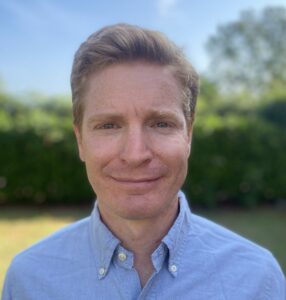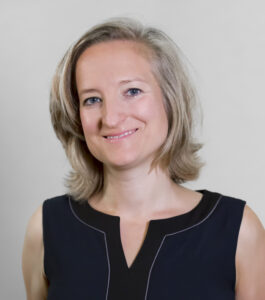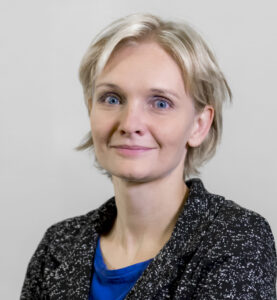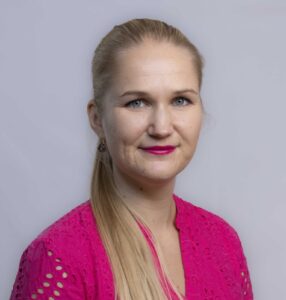Healthy Europe introduces four team members who have been working for the European Health Forum Gastein (EHFG) for many years: IT technician Martin Köstinger, senior advisor Louise Boyle, conference coordinator Christine Huttegger, and project manager Mari Pollari.
Text: Dietmar Schobel

Martin Köstinger: “I have worked for the European Health Forum Gastein every year since the event was first held in 1998 – I originally came to the forum via my brother Christoph, who was EHFG General Secretary at the time.” To begin with, his main job was putting invitations in envelopes, which back then were sent in their tens of thousands: “The post office clerk in Bad Hofgastein couldn’t believe his eyes when we arrived with all these letters.” Later on, he helped out in the IT team and has been running it since 2003: “It used to be a question of making a few computers available for a large number of visitors. Today, each participant brings many different digital consumer devices to a hybrid conference and our job is to make sure that all of these can be used quickly and easily in our network on site.”
I have worked for the European Health Forum Gastein every year since the event was first held in 1998.
MARTIN KÖSTINGER, IT TECHNICIAN
The youngest of five children, Martin Köstinger (40) was brought up in the traditional Hotel Rauscher in Bad Hofgastein, which was run by his mother Gunda. His father Manfred (1938–2016) was the student world champion in downhill skiing in 1960 and was also the architect who planned the Bad Hofgastein Conference Centre, where the EHFG holds its events. Martin Köstinger taught himself programming in “C” at the age of 15 and went on to study at Graz University of Technology. In 2013, he completed his doctoral dissertation in Computer Sciences on Efficient Metric Learning for Real-World Face Recognition.
From 2014, he was a programme manager at Microsoft, and since 2016 he has been conducting research for a major online service provider on how air drones might best be used for deliveries. Martin Köstinger is married with two children, Felix (8) and Laura (5). His hobbies include snowboarding, ski tours, climbing and fishing, and above all sports involving all the family: “We went on a tour with our kids where we cycled around 40 kilometres from Ehrenhausen in Styria to Bad Radkersburg in one day recently. And we plan to cycle the entire Murradweg in several stages.”

“A whole string of happy coincidences led me to the European Health Forum Gastein,” Louise Boyle says. She grew up in a rural hamlet in the Chiltern Hills in Buckinghamshire, England. A formative experience occurred during her Sixth Form studies, when she and a number of fellow students undertook a one-month expedition to Peninsular Malaysia. The programme included a 9-day jungle trek culminating in the ascent of the highest mountain in Malaysia, and helping out in a home for persons with disabilities in Kuala Lumpur. As Louise Boyle recalls: “This trip really whetted my appetite for connecting with people from different cultures and seeing how they lived.” It was followed by journeys to other countries in the global south, including a three-and-a-half-month stay in Nepal and a two-month marine conservation expedition in the Bay Islands of Honduras, Central America.
A whole string of happy coincidences led me to the European Health Forum Gastein.
LOUISE BOYLE, SENIOR ADVISOR
After studying Social Sciences at the University of Durham, Louise Boyle began work as a civil servant for the UK Government. She worked for a number of government departments on a range of policy areas with public health links, from preventing extremism in the wake of the 2005 London bombings, to tackling violence against women and girls. To further develop her public health knowledge, from 2008 to 2009 she took a career break to gain an MSc in Public Health from the London School of Hygiene and Tropical Medicine. For her Master´s degree thesis she travelled to Sierra Leone, West Africa, with the NGO GOAL Ireland, and conducted a process evaluation of a sanitation project in rural communities near the border of Liberia and Guinea. While there, she met her future partner, a teacher from Upper Austria, who was relocating to Bad Hofgastein to take up a teaching position.
After a year working again for the UK Government, in December 2010 Louise Boyle also decided to move to Bad Hofgastein, where she came across the European Health Forum Gastein. She has worked for the EHFG since 2011 and is responsible, amongst other things, for the thematic programme and content development of the conference and associated events. “My work allows me to use my interpersonal skills and my public health knowledge and connections,” she enthuses. She has a nine-year-old son, and her hobbies include tennis, swimming, scuba diving, skiing, travelling and reading.

“You only notice my job when something goes wrong,” says Christine Huttegger, a native of Bad Hofgastein. Thankfully, this happens very rarely as she is responsible for the overall coordination of the European Health Forum Gastein (EHFG). During the event itself, this means making sure that there is smooth interaction between the shuttle drivers, the conference technology team members, the IT technicians and the students helping and looking after the individual sessions and plenaries, and coordinating with the employees from the catering companies and the hotels serving the EHFG. What is most important about this? “You have to think about the situation at the time of the conference and there is always something that can be improved already in advance”, answers Christine Huttegger.
Being able to help other people gives me strength and makes me happy.
CHRISTINE HUTTEGGER, CONFERENCE COORDINATOR
By her own account, the conference coordinator spends the summer months in the office, but the rest of the year is far less hectic. She studied at the tourism college in Bad Hofgastein, which included summer internships working in service and cuisine and at receptions of various hotels. Following this, Christine Huttegger worked on Guernsey in the Channel Islands, in Italy and elsewhere. By working in tourism, she also financed her language and translation studies – Italian and Russian – at the University of Innsbruck. From June 2007, she spent a semester studying abroad in the Russian city of Nizhny Novgorod. As Christine Huttegger recalls: “There, I experienced at first hand how lucky we are to be living in a democratic country like Austria with an effective health system.”
Today, she is back in her native Bad Hofgastein, where she lives with her family and likes to ski and hike in her free time. Christine Huttegger draws mental strength from her voluntary work as a first aid paramedic: “Being able to help other people gives me strength and makes me happy – because you get a whole lot back from the patients as well.”

“I enjoy working with people and helping them to achieve success in their projects. Hearing that participants benefit from our activities and programmes is the most rewarding aspect for me,” says Mari Pollari, who oversees the Young Forum Gastein (YFG) and is involved in coordinating the Women in Global Health Austrian Chapter. The YFG is a unique network for young health professionals and experts, currently comprising over 600 members. During the EHFG conference, Young Gasteiners play an active role by interviewing speakers, hosting discussions, and reporting from the sessions.
I enjoy working with people and helping them to achieve success in their projects.
MARI POLLARI, PROJECT MANAGER
Mari Pollari grew up in Vantaa, a city with around 250,000 inhabitants near the Finnish capital, Helsinki. After completing her school-leaving exams, she worked as an au pair in Germany before pursuing a degree in European Public Health at Maastricht University in the Netherlands. Reflecting on her interest in the field, she explains: “It expanded my understanding of the holistic nature of health, including how our well-being is affected by lifestyle as well as economic and environmental factors.”
After graduation, Mari spent four years working for a German tourism company in Spain where, among other things, she was responsible for designing programme activities and managing guest relations: “This experience provided me with valuable skills that I now apply in my role at the European Health Forum Gastein,” she notes. Mari highlights the importance of project management skills, a service-oriented approach, and event facilitation as the key cross-cutting skills across the sectors.
